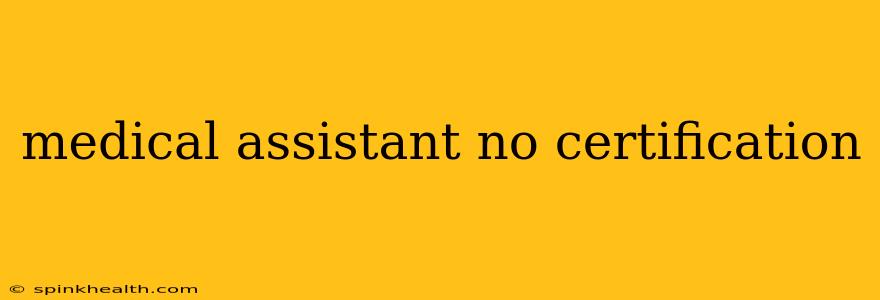The crisp white coat, the reassuring smile, the efficient organization – the image of a medical assistant is one of competence and calm amidst the bustling atmosphere of a doctor's office or clinic. But what if you aspire to this role without the traditional certification? Can you work as a medical assistant without certification? The answer, like many things in healthcare, is nuanced.
This journey begins not with a definitive yes or no, but with a careful exploration of the landscape. While certification significantly enhances your prospects, it's not necessarily the only pathway into the field. The reality is a bit more complex, a mosaic of possibilities shaped by location, employer needs, and your own drive and determination.
What Does a Medical Assistant Do?
Before delving into the certification question, let's understand the core responsibilities. Medical assistants are the unsung heroes of healthcare, performing a wide variety of tasks under the supervision of physicians and other healthcare professionals. Their duties can range from:
- Taking patient vitals: Measuring blood pressure, temperature, heart rate – the essential first steps in patient care.
- Preparing patients for examinations: Making sure patients are comfortable and have the necessary information.
- Assisting with procedures: Aiding doctors during examinations and minor procedures.
- Maintaining patient records: Ensuring accurate and organized documentation.
- Performing administrative tasks: Scheduling appointments, handling insurance claims, managing phone calls – the backbone of efficient clinic operations.
This versatility makes the role incredibly rewarding, but also highlights the need for a certain level of training and competency.
How Important is Certification for Medical Assistants?
This is the million-dollar question. While technically, some employers might hire individuals without certification, especially for entry-level positions or in settings with low patient volume, the reality is that certification significantly increases your chances of landing a job and achieving career advancement.
Certified medical assistants (CMAs) possess a recognized credential, demonstrating a commitment to professional development and a baseline level of competency. This credential boosts your credibility and sets you apart from uncertified candidates.
What are the Alternatives to Certification?
While certification is strongly recommended, several paths could lead you to a medical assistant role without formal certification:
- On-the-job training: Some clinics might offer on-the-job training, allowing you to learn the ropes while working. However, this is less common and often requires prior experience in a related field.
- Relevant experience: Experience in healthcare, such as working as a nursing assistant or in a related administrative role, can help you leverage your existing skills and knowledge. This experience, however, is unlikely to fully replace the breadth and depth of formal training provided by certification programs.
- Unconventional routes: Some smaller practices might be less stringent regarding certification, especially in areas with a shortage of qualified medical assistants.
What are the Benefits of Getting Certified?
The advantages of certification are numerous and impactful on your career trajectory. Consider these benefits:
- Increased job opportunities: Certification opens doors to a wider range of employment options.
- Higher earning potential: Certified medical assistants typically command higher salaries.
- Enhanced credibility: Certification demonstrates your commitment to the profession and your competence.
- Professional development: Certification programs provide comprehensive training and education.
- Career advancement: Certification can pave the way for promotions and leadership roles.
Is it Worth Pursuing Certification?
Ultimately, the decision of whether or not to pursue certification is a personal one. While technically you can work as a medical assistant without certification, the overwhelming benefits of certification make it a highly recommended pathway. The investment of time and resources in obtaining certification is likely to pay off significantly in the long run through increased job security, higher earnings, and a more fulfilling career. Weigh the short-term challenges against the long-term advantages, and the answer will likely become clear.
Where Can I Find More Information About Certification Programs?
Numerous organizations offer Medical Assistant certification programs. Researching these programs, their requirements and the associated costs is crucial for anyone looking to formalize their credentials. Always verify the credibility of the certification program before investing your time and money.

